The thought of eating handmade noodles was too tantalizing to ignore. So within a week of hearing that they were a specialty at Korean Noodle House (1415 Murray Bay St., 713-463-8870), I made a special trip out to our Koreatown area on Long Point -- about a 45-minute drive for me -- just to give them a try.
I'd heard beforehand that the place was small, but had it not been for our GPS, we would have missed the old house that housed the restaurant entirely. It was hidden behind trees and foliage on a poorly lit side street about half a block off of Long Point near the Gessner intersection. The signage wasn't prominent either, placed as it was above the door of the house, and written entirely in Korean characters. But that's usually the beauty of finding one of these off-the-beaten-path-type places. They are hard to find, but in the end you don't care because it's all about the food anyway.
We could see people eating inside, but when we opened the door, there was no one to greet us. As we walked into the harshly lit main dining room (they really need to do something about the horrible lighting), a young man who had been eating at one of the tables got up and said, "You can sit wherever you want."
I chose a table towards the back of the restaurant, and grabbed one of the laminated menus, which had been propped up on the side of the table with the Korean side facing outward. In fact, at all of the tables, the menu was displayed in this way, telling me that the clientele was primarily Korean.
The English-menu version was printed on the flip side and was very simply organized under the categories "cold noodle," "hot noodle," "served with rice," and "side dishes." Most dishes were about $9 to $10. We settled on the dumpling kalguksu, a beef soup with dumpling and noodle, the dolsot bibimbap (sizzling hot pot rice with extra bulgogi beef) and seafood pancake.
While most Korean restaurants serve an assortment of side dishes, or banchan, at Korean Noodle House, all they give you is a small earthenware pot of house-made kimchi. But this was no ordinary kimchi. It was the best kimchi I've had in Houston to date.
Where some kimchis are very tart and sour, the pickling juice in this kimchi was an addictive mix of sweet, sour and spicy. And even though I'm a total spice wimp, usually staying clear of super-spicy foods, the flavor was so good that I kept on digging into that kimchi pot even as my mouth burned fiery-hot and a slight sheen of sweat broke out on my temple.
I wish I could say that our main dishes were as remarkable as the free kimchi. The dumping kalguksu had a ton of noodles in it, easily enough for two to share, but the broth was bland and the dumplings had this funny aroma of cinnamon that did not work for me. Also, the noodles were packed so tight in the bowl that they ended up overcooked and mushy, not what I had hoped to find at all.
Compared to the memorable kalguksu I'd tried at Soju Bang on my recent mini-tour of K-town, I am sad to say that this one was a disappointment.
The dolsot bibimbap, likewise, was just okay. The bulgogi we paid an extra $2 for was plentiful but very dry, and the flavors of the bibimbap were smoky but in an unpleasing way -- I think it was the purple pickled cabbage bits that killed this dish for me. And the seafood pancake, which is usually hard to mess up, looked and tasted like it had just been microwaved. It's supposed to have a bit of a chew, which it did, but there wasn't that just-off-the-pan crispness that usually makes the pancake so good.
In the end, I went in search of great hand-made noodles, but instead found some kickin' kimchi. I probably won't venture back specifically to dine at this restaurant, but if I'm in the neighborhood again the kimchi is good enough to warrant another visit.
Follow Eating Our Words on Facebook and on Twitter @EatingOurWords






